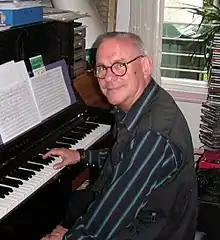John White | |
|---|---|
 | |
| Background information | |
| Born | April 5, 1936 Berlin, Germany |
| Died | January 4, 2024 (aged 87) London, UK |
| Genres | Experimental, opera, classical |
| Occupation(s) | Composer, performer |
| Instrument(s) | Keyboard, piano, tuba, helicon |
John White (5 April 1936 - 4 January 2024) was an English experimental composer and musical performer. He invented the early British form of minimalism known as systems music, with his early Machines.
Life and career
White was born in Berlin to an English father and German mother. The family moved to London at the outbreak of war. Originally a sculptor, White decided on a composition career when he heard Messiaen's Turangalîla-Symphonie. He studied composition at the London Royal College of Music from 1955 to 1958 with Bernard Stevens and piano with Arthur Alexander and Eric Harrison. He also took analysis classes privately with Elisabeth Lutyens. Upon graduation, White became the musical director of the Western Theatre Ballet, and then professor of composition at the Royal College of Music from 1961 to 1967. He was a skilled pianist and tuba player and has written extensively for both instruments.
In the 1960s and 1970s he was closely associated with English experimental composers such as Cornelius Cardew and Gavin Bryars. His Royal College of Music pupils have included Roger Smalley, Brian Dennis and William York. White's association with younger composers, including Christopher Hobbs, Dave Smith, Benedict Mason, and John Lely has led to many British ensembles, including the Promenade Theatre Orchestra, Hobbs-White Duo, Garden Furniture Music, the Farewell Symphony Orchestra and other groups.
John White was the longest-serving faculty member at Drama Centre London, holding the position of Head of Music for four decades until March 2020. White's contribution as a musical educator and artistic mentor had a significant influence on the aesthetic outputs of multiple generations of British actors and directors.
Works
White's style was informed by what Dave Smith called an 'apparently disparate collection of composers from the world of "alternative" musical history',[1] including Satie, Alkan, Schumann, Reger, Szymanowski, Busoni and Medtner. These composers influenced his piano sonatas, which White wrote from 1956 onward, but other influences on his wider work included Messiaen, Rachmaninoff, and the electronic pop ensembles Kraftwerk and The Residents. Although it is so eclectic as to cover a wide range of styles, White's work has been called ironic, 'experimental', and even 'avant postmodern'.[2] Although White had worked in what could be called an 'experimental' style since 1962,[3] he composed music using indeterminate means after 1966. His later work included music with numerical and other systems processes.
As of 2019, White had written 180 piano sonatas, 25 symphonies, 30 ballets, and much incidental music for the stage, all in a highly eclectic style (or, more accurately, range of styles). His stage music includes commissions by the Royal Shakespeare Company and the Royal National Theatre. White wrote several scores for internal projects and public productions, including his final score for Drama Centre, Mother Courage and her Children (2015). Other projects include a set of song cycles, one of which consists of settings of friends' addresses.
See also
References
- ↑ Smith, Dave. "'The Piano Sonatas of John White'" (PDF). Journal of Experimental Music Studies. Archived from the original (PDF) on 16 February 2012. Retrieved 10 March 2012.
- ↑ Wright, David. 'Party Time', The Musical Times, Vol. 138, No. 1848 (1997), p.42.
- ↑ Walker, Sarah E. 'The New English Keyboard School: A Second "Golden Age"', Leonardo Music Journal, 11 (2001), p. 18.
External links
- White's Piano sonata no. 95 on YouTube, played by Jonathan Powell at the 'Indian Summer in Levoca' festival, 2008.
- Convivium Records. John White: Adventures at the Keyboard
- Experimental Music: John White performs his sonatas
Sources
- Anderson, Virginia. 1991. 'White, John'. In Contemporary Composers. London: St. James Press.
- Anderson, Virginia. 1983. "British Experimental Music: Cornelius Cardew and his Contemporaries". M.A. thesis, Redlands, California: University of Redlands (Facsimile edition published 2000, Leicester: Experimental Music Catalogue; new edition forthcoming, as Experimental Music in Britain.)
- Smith, Dave, “Albus Liber: Exploits and Opinions of John White, Composer Volume I” (Journal of the London Institute of 'Pataphysics), Atlas Press, 2014. ISBN 9781900565240